Japan-Myanmar Relations
Meeting Between Prime Minister Abe and Myanmar State Counsellor Aung San Suu Kyi
 (Photo: Cabinet Public Relations Office)
(Photo: Cabinet Public Relations Office)
 (Photo: Cabinet Public Relations Office)
(Photo: Cabinet Public Relations Office)
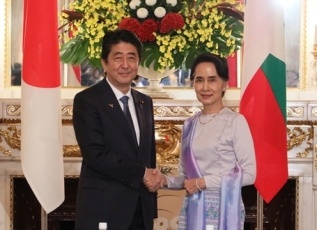 (Photo: Cabinet Public Relations Office)
(Photo: Cabinet Public Relations Office)
- 1. Bilateral Meeting
- 2. Signing Ceremony, Joint Press Conference, and Dinner Reception Hosted by Prime Minister Abe
1. Bilateral Meeting
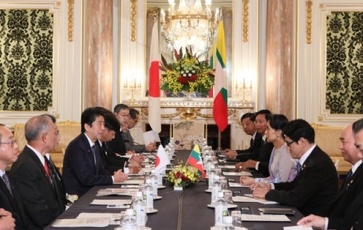 (Photo: Cabinet Public Relations Office)
(Photo: Cabinet Public Relations Office)
On November 2, commencing from just after 6pm for about 70 minutes, Mr. Shinzo Abe, Prime Minister of Japan, met with H.E. Ms. Aung San Suu Kyi, State Counsellor of the Republic of the Union of Myanmar, who is paying an official visit to Japan. The overview is as follows. Other attendees at the meeting were Mr. Fumio Kishida, Minister for Foreign Affairs, Mr. Koichi Hagiuda, Deputy Chief Cabinet Secretary, Mr. Yohei Sasakawa, Special Envoy of the Government of Japan for National Reconciliation in the Republic of the Union of Myanmar, and Mr. Shotaro Yachi, Secretary General of the National Security Council.
(1) At the outset, Prime Minister Abe welcomed State Counsellor Aung San Suu Kyi on her visit to Japan, expressed his happiness at meeting again for the first time in two months since their meeting at the East Asia Summit in Laos in September, and offered a heartfelt welcome for her first visit to Japan in three years since 2013. He also expressed respect for Myanmar’s efforts on nation building under the leadership of State Counsellor Aung San Suu Kyi who shares the fundamental values of freedom, democracy, human rights, and rule of law with Japan and explained that Japan intends to give its full support at public and private levels to the new government as a friend of Myanmar. He also conveyed his hope to work with State Counsellor Aung San Suu Kyi , building upon this visit, to dramatically advance the relationship between Japan and Myanmar.
In response, State Counsellor Aung San Suu Kyi expressed her gratitude for the warm hospitality and while noting the historically good ties between Japan and Myanmar, she also voiced a desire to maintain the ties and move forward together with Japan as a trustful partner rooted in a longstanding friendship. She thanked Japan for its assistance, including in areas of peace and stability, up to now and the Japanese people for their warm support.
(2) Prime Minister Abe spoke highly of the excellent leadership exhibited by State Counsellor Aung San Suu Kyi in the new government, welcomed Myanmar’s elimination of the Emergency Provisions Act and other measures to respect democracy and basic human rights, advances in reconciliation seen in the successful 21st Century Panglong Union Peace Conference, and the establishment of a foundation for economic development, including the formulation of a new investment law, and reaffirmed Japan’s full support for the new government. Additionally, Prime Minister Abe noted that Myanmar is a partner that shares fundamental values with Japan and emphasized the five following point from the perspective of giving robust support to the initiatives of State Counsellor Aung San Suu Kyi.
(a) National Reconciliation
Prime Minister Abe explained that Japan intends to continue supporting State Counsellor Aung San Suu Kyi in regard to the Myanmar government’s top priority of national reconciliation with efforts by Special Envoy Sasakawa, welcomes initiatives that aim to leverage diversity, an important aspect of Myanmar, as a strength, plans to give assistance totaling 40 billion yen over five years to areas with ethnic minority peoples to support advances in reconciliation. Prime Minister Abe stated that plans to provide assistance on behalf of peace and stability in Rakhine State that confronts complicated issues.
(b) Economic cooperation
Prime Minister Abe explained that Japan fully supports Myanmar’s policy of promoting balanced development among states and regions to provide an economic buttress to national reconciliation, that the Japan-Myanmar Cooperation Program (PDF) / Project list (PDF)
/ Project list (PDF) targets balanced development of rural and urban areas, and that Japan plans to contribute 800 billion yen over five years, starting this fiscal year, at public and private levels in areas including assistance to areas with ethnic minority peoples, agriculture, Yangon urban development, electric power, airports, and human resource training, and to support renovations to hydropower facilities and expansion of regional hospitals as part of these activities.
targets balanced development of rural and urban areas, and that Japan plans to contribute 800 billion yen over five years, starting this fiscal year, at public and private levels in areas including assistance to areas with ethnic minority peoples, agriculture, Yangon urban development, electric power, airports, and human resource training, and to support renovations to hydropower facilities and expansion of regional hospitals as part of these activities.
(c) Promotion of Private-Sector Investment
Prime Minister Abe explained that the key to success in economic policy is expansion of employment through private-sector investment and human resource training, that Japan intends to contribute to establishment of systems that promote investments through public-sector and private-sector dialogue with the Myanmar government, and that Japan promises to promote responsible investment that improves the standard of living for the Myanmar people and plans to steadily promote development adhering to international standards in the Thilawa special economic zone as a symbol.
(d) People Exchanges and Human Resource Development
Prime Minister Abe explained that exchanges involving young people who take responsibility in the future and technology transfers are important, that he welcomes the agreement reached this time on dispatching Japan Overseas Cooperation Volunteers (JOCV), and that Japan will launch an Innovative Asia program as a new effort to train and promote circulation of advanced human resources, including internship opportunities in Japan, from its next fiscal year. Additionally, he noted that Japan plans to implement exchanges and human resource development on the scale of 1,000 people a year to help in nation building.
(e) Role of the Military in a Democratic Regime
Prime Minister Abe explained that the role of the military has a significance in the new democratic regime, that activities by the Japan Self-Defense Forces after the war offer an example, and that Myanmar’s military and the Japan Self-Defense Forces have built a close relationship and Japan hopes to continue and expand defense cooperation and exchanges, including acceptance of Myanmar students to the Ministry of Defense’s educational institutes, interactions at the senior officer level, and assistance for building capabilities to deal with disasters.
(3) State Counsellor Aung San Suu Kyi offered the following comments in response.
(a) Prime Minister Abe’s comments are a good fit with our goals. Myanmar would like to express its gratitude to Special Envoy Sasakawa and other friends regarding their assistance to stability and reconciliation. We intend to utilize the 40 billion yen in assistance from Japan to the greatest extent possible. Myanmar will strive to resolve the Rakhine State problem in accordance with the rule of law. Some voices are saying that economic advancement in Rakhine State would help solve the problems of the State, and the Myanmar Government will make these efforts.
(b) As mentioned by Prime Minister Abe in his comments on balanced development in urban and rural areas, Myanmar is placing emphasis on dealing with Yangon’s urban development, transportation system, and electricity shortages and also the development of farming villages and related technology transfers. Japan’s seed bank assistance is effective, and Myanmar is grateful for this support. Key policies for Myanmar’s advancement are job creation, building the transportation network, energy, and human resource development.
(c) I agree with Prime Minister Abe’s emphasis on the importance of private-sector investments. Myanmar hopes to attract foreign investors by the new investment law. Myanmar is pleased with substantial progress in the Thilawa Special Economic Zone thanks to Japan’s contributions and will be taking steps toward achieving further success.
(d) Myanmar thinks it can cooperate in a variety of areas for human resource development and looks forward to working together. Myanmar also believes that the agreement on the Japan Overseas Cooperation Volunteers (JOCV) reached this time can expand interactions among young people. It hopes that many tourists will come from Japan too as part of human-level interactions.
(e) Regarding defense exchanges, Myanmar welcomes cooperation with our military under a democratic government.
(4) Regional and international issues
Prime Minister Abe explained that he is advocating a “Free and Open Indian-Pacific Ocean Strategy” that highlights the central role of interaction between the “two continents” of Asia and Africa and the “two oceans” of the Indian Ocean and Pacific Ocean for regional stability and prosperity and thinks, in addition to strengthening connectivity in the Mekong region, connectivity with India as a democratic country by Myanmar is important for not only its economy, but also regional peace and stability and rule of law. Furthermore, next year is the 50th anniversary of the establishment of ASEAN, and Japan intends to continue to support the centrality and integration of ASEAN. He also noted that the abductions issue is a top priority in regard to the North Korea situation and requested understanding and support. He expressed Japan’s desire to continue cooperation with the Myanmar Government in addressing North Korea’s nuclear weapon and missile issues, problems in the South China Sea, and other matters.
In response, State Counsellor Aung San Suu Kyi commented on the relationship between Myanmar and India, and the South China Sea and North Korea issues.
2. Signing Ceremony, Joint Press Conference, and Dinner Reception Hosted by Prime Minister Abe
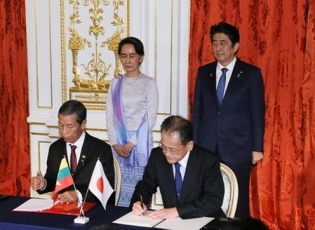 (Photo: Cabinet Public Relations Office)
(Photo: Cabinet Public Relations Office)
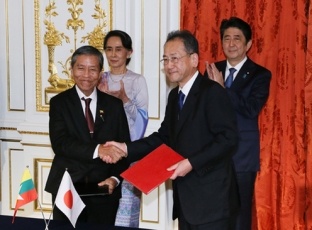 (Photo: Cabinet Public Relations Office)
(Photo: Cabinet Public Relations Office)
(1) Signing Ceremony
Signing of the agreement on the dispatch of Japan Overseas Cooperation Volunteers with Myanmar took place in the presence of Prime Minister Abe and State Counsellor Aung San Suu Kyi (signing parties: Mr. Kyaw Win, Union Minister for Planning and Finance of the Republic of the Union of Myanmar and Mr. Tateshi Higuchi, Ambassador Extraordinary and Plenipotentiary of Japan to the Republic of the Union of Myanmar).
 (Photo: Cabinet Public Relations Office)
(Photo: Cabinet Public Relations Office)
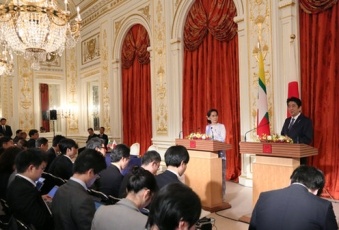 (Photo: Cabinet Public Relations Office)
(Photo: Cabinet Public Relations Office)
(2) Joint Press Announcement and Dinner Reception Hosted by Prime Minister Abe
After the exchange of documents ceremony, Prime Minister Abe and State Counsellor Aung San Suu Kyi held a joint press announcement.
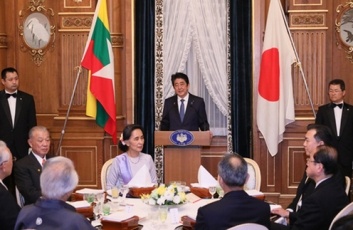 (Photo: Cabinet Public Relations Office)
(Photo: Cabinet Public Relations Office)
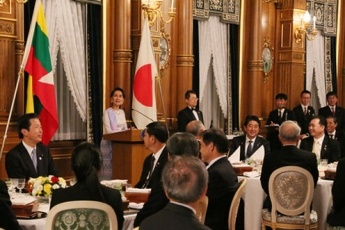 (Photo: Cabinet Public Relations Office)
(Photo: Cabinet Public Relations Office)
The following dinner reception hosted by Prime Minister Abe brought together about 70 people with connections to Myanmar. Conversations covered a broad range of issues related to strengthening the relationship between the two countries in a very friendly atmosphere.

